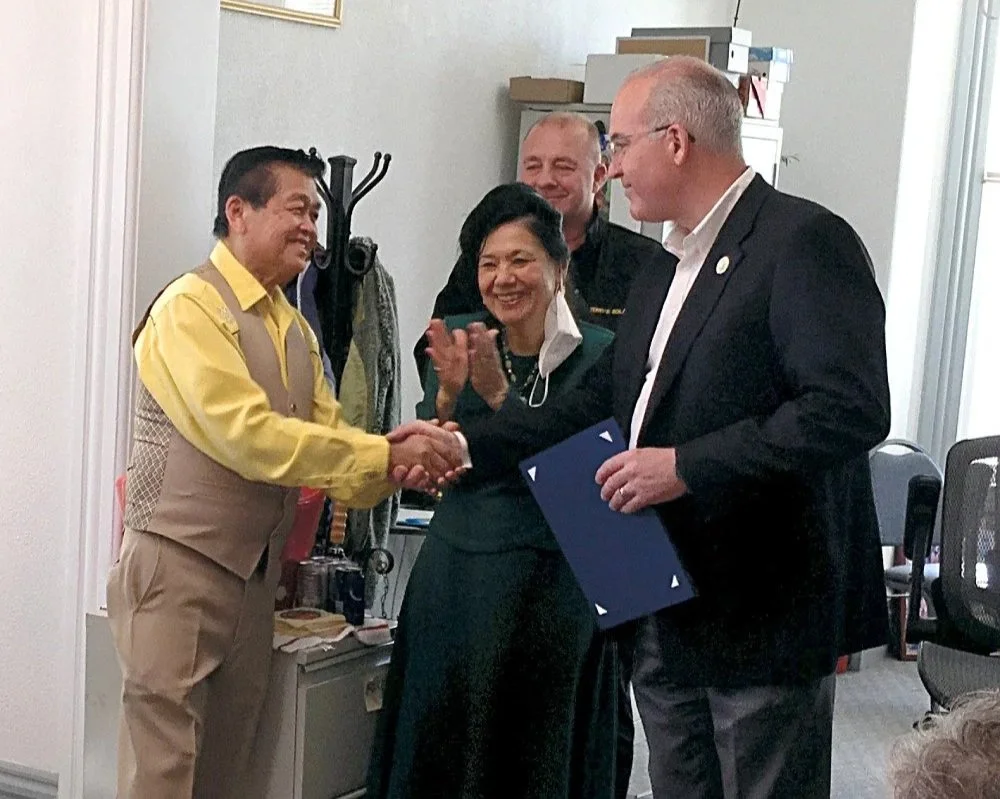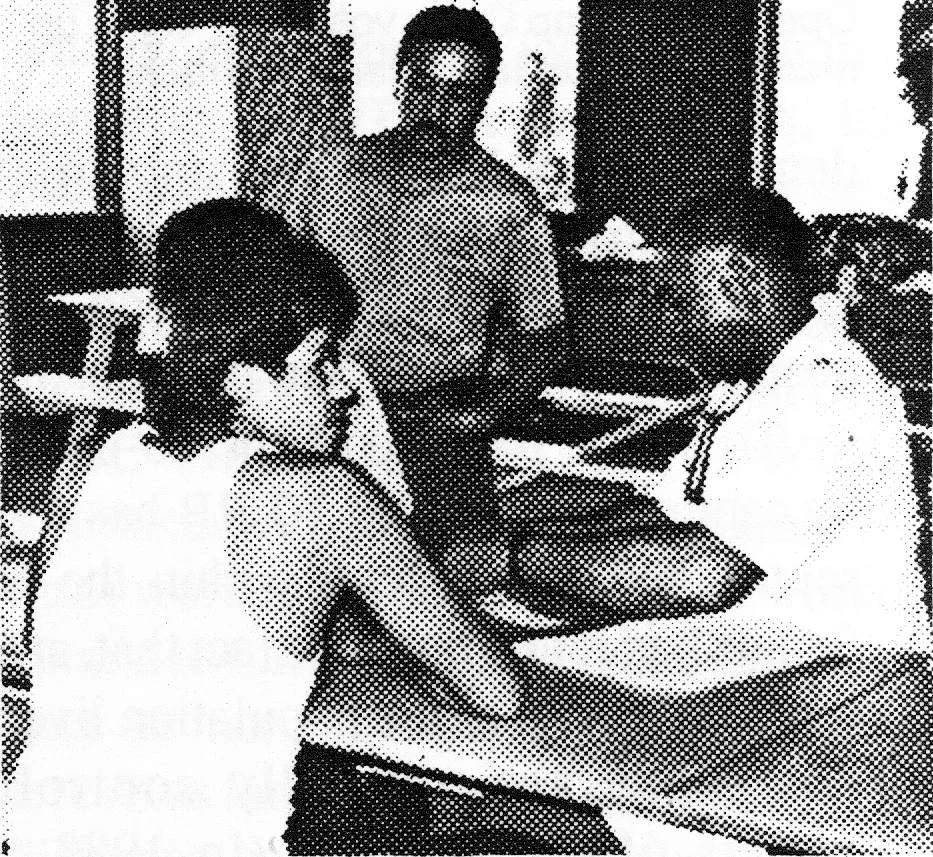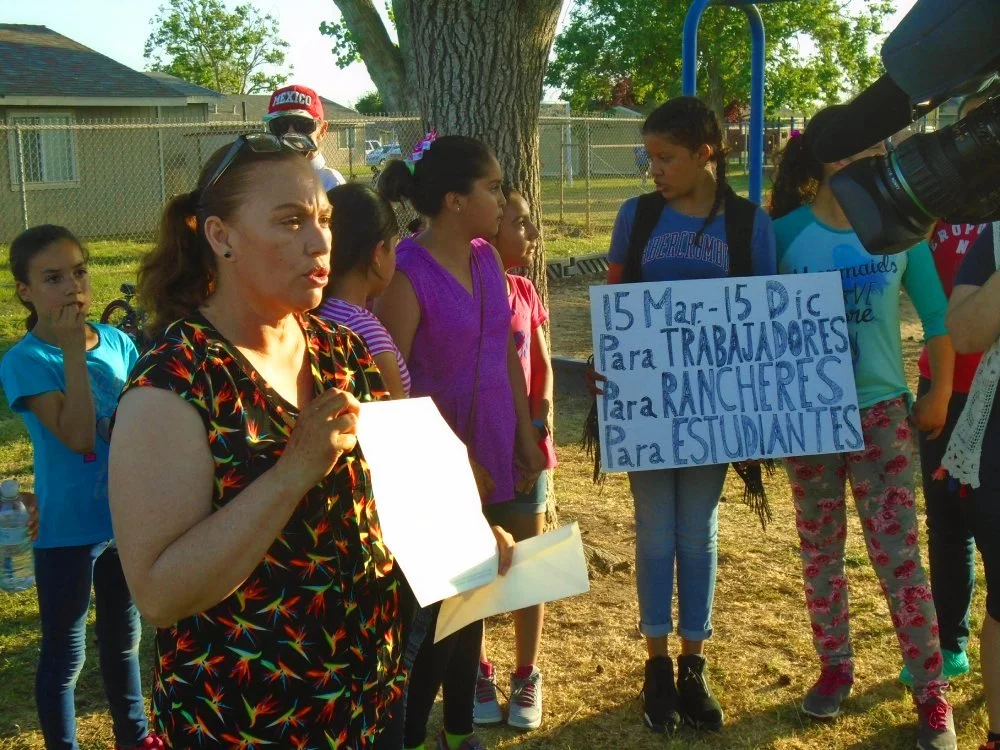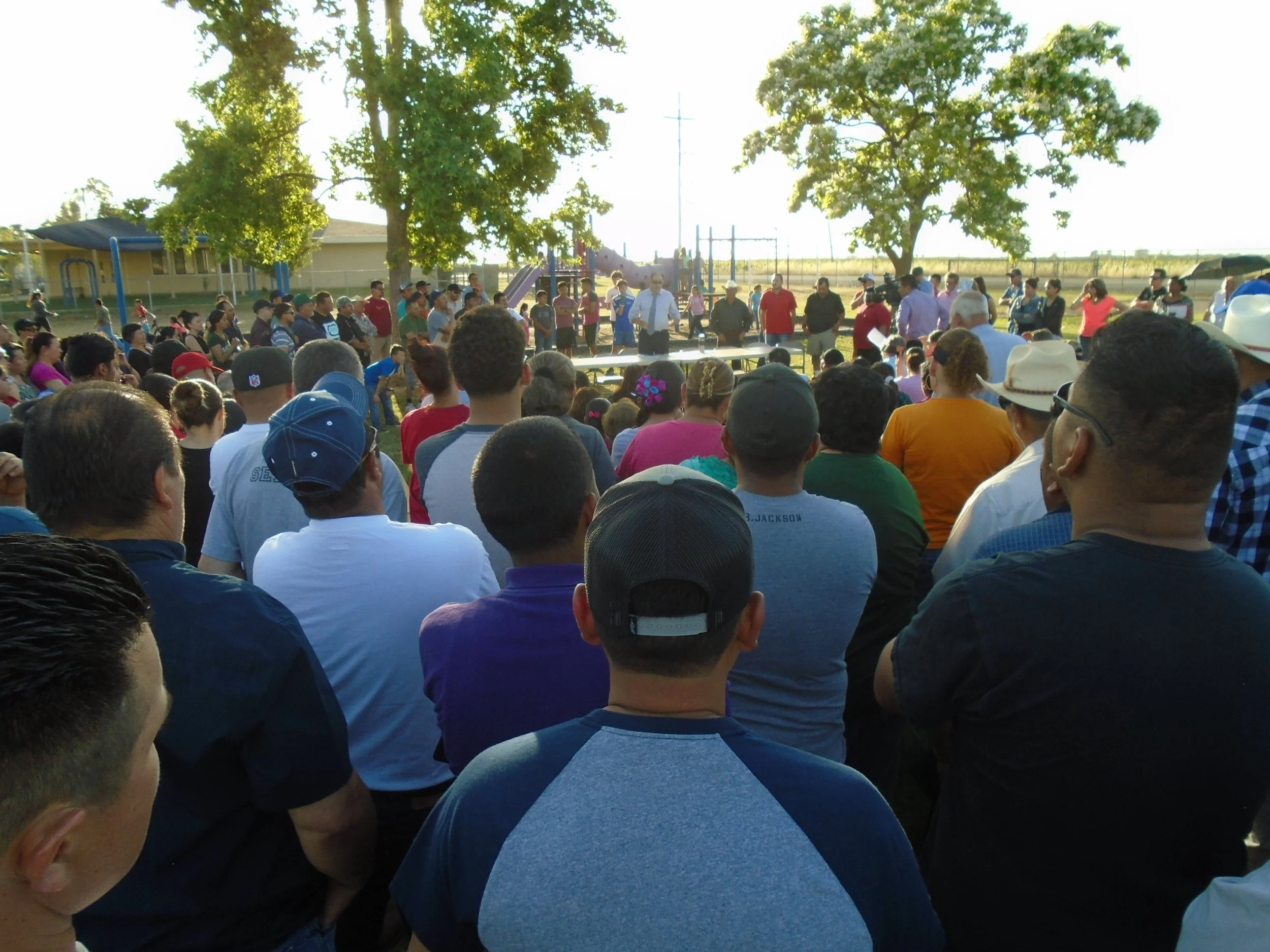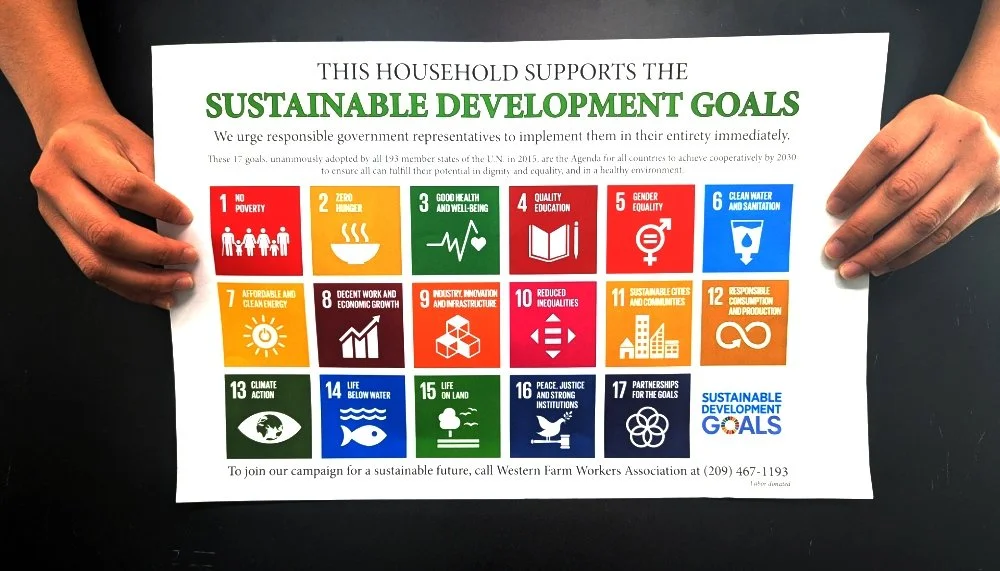
WFWA History
WFWA founding member Tito Petalio receives a certificate of recognition from the Stockton City Council, accompanied by WFWA founding organizer Penelope Montemayor.
Founding WFWA Member Tito Petalio
Tito Petalio is a founding member and President of Western Farm Workers Association. When Tito joined as a member of WFWA in June of 1983, he was working near Stockton picking cucumbers for 5 cents a bucket as part of an all-Filipino crew of 53 farm workers.
Originally from the capital city of the Philippines, Manila, Tito came to the U.S. seeking a better life, bringing his traditions of hard work, sense of community and warm hospitality to the fertile land of the Delta where fellow countrymen had come before him. In the 1920s and the decades that followed, young Filipino workers came to Stockton where agricultural work could be found nearly year-round. Due to racism and discriminatory laws, the mostly young men who took on the harsh working conditions were barred from even crossing Main Street into what was then the exclusively white northern section of the city.
In response, they built their own community south of Main Street, with restaurants, hotels, grocery stores, barber shops, the Rizal Social Club, the Daguhoy Lodge, a rescue mission and more, creating what became Stockton's “Little Manila.”
Tito has since been recognized by many for his steadfast contributions to the farm worker struggle for justice.

1983
Founding of WFWA
In 1983, Penelope Montemayor responded to the call by Antonio Orendain, president of Texas Farm Workers Union (TFWU), to build a labor organization of a new type in the San Joaquin Valley. Montemayor’s father, Alipio Mabalot Montemayor, had been a member of Agricultural Workers Organizing Committee (AWOC). AWOC, led by militant Filipino farm labor organizer Larry Itliong, had led strikes throughout the San Joaquin Valley of Filipino migrant farm workers in the late 1950s and early 1960s. Itliong was instrumental in helping to build an alliance with Mexican farm worker organization National Farm Workers Association (NFWA) to form United Farm Workers Organizing Committee (UFWOC). Montemayor also enlisted former UFWOC Vice President Philip Vera Cruz, in addition to Julian Balidoy, James Yballa and farm labor contractors Rose Atad and Fred Rayray as Organizing Committee members for the nascent drive. Farm workers, labor contractors, professionals, clergy and community members launched WESTERN FARM WORKERS ASSOCIATION (WFWA) in the long-term interest of farm workers fighting to end poverty.

1987
Wildcat Strike of Tomato Workers
In response to the lack of safe drinking water and lack of access to toilets, along with unpaid wages and physical violence perpetrated on a young pregnant female farm worker, San Joaquin Valley farm workers called a wildcat strike against tomato growers in the area. WFWA assisted members in forming Tomato Workers Ad Hoc Committee (TWAHC), which provided its members with legal assistance, work clothes, a job board, an Occupational Health Project, transportation network, survival English classes and more.

1996-
2013
Farm Workers Win Class Action Lawsuit
In 1996 and 1997, volunteer attorneys filed suit on behalf of migrant farm worker residents of state-run Office of Migrant Services (OMS) camps when the state illegally doubled the rent. An eight-year legal battle followed, resulting in a landmark $1.2 million settlement for individual residents in June 2004 in over 20 camps from Arizona/Mexico border to the Oregon border. Farm worker organizers led an exhaustive statewide search and successfully reached nearly 70% of the migrant workers eligible to make claims for the money owed to them by the state (far higher than the 9% national average for the percentage of members of a class awarded a settlement actually located). The residual funds from the class action lawsuit were used for camp improvements, decided upon by camp residents. In one instance 200 brand-new stoves were installed at Artesi II and III camps in French Camp near Stockton after workers complained that the old stoves had been dangerously malfunctioning for years.
First two pages from the landmark $1.2 million settlement, along with a copy of the form for migrant workers to reclaim their funds.
2011-
2019
Fight for Affordable Utilities
WFWA members, volunteers and supporters ran a petition drive and attended public hearings after Pacific Gas & Electric (PG&E) filed for billions of dollars in rate increases. The state agency responsible for regulating the cost of investor-owned utilities and ensuring fair and reasonable rates to ratepayers, the California Public Utilities Commission (CPUC), engaged in tactics ranging from last-minute changes to the hearing time, to rescheduling the hearing dates altogether. WFWA speakers denounced the actions of the CPUC and demanded that the CPUC live up to its mission statement:
The California Public Utilities Commission serves the public interest by protecting consumers and ensuring the provision of safe, reliable utility service and infrastructure at reasonable rates with a commitment to the environmental enhancement and a healthy California economy.
WFWA speakers cited the devastating effects of rate increases on already-struggling families, as well as the wider effect on small businesses when workers do not have money to spend in the local economy. WFWA volunteer utility advocates worked side-by-side with WFWA members to stop utility shutoffs, gain restoration of services and advocate for reasonable payment plans, as well as locate and apply for government programs.

2015
WFWA Members Win School Bus Transportation for the Children Residing at Migrant Centers
WFWA organizers, members and residents at the Artesi III Migrant Center in French Camp announced a victory when the Manteca Unified School Board voted to shoulder the funding for public school bus service for children of migrant workers. The federal Office of Migrant Education had cancelled school bus service to and from the Migrant Center, even though the walking trip for the elementary school children was very dangerous and included crossing railroad tracks and two busy freeway entrances.

2016-
2017
WFWA Members Win Restoration of the Full Nine Months at State-run Migrant Centers
OMS announced it would shorten the season for San Joaquin County’s migrant labor centers from nine months to six months. WFWA members living at Artesi II took the position that an early closure was detrimental to farm workers and the local area growers who depend upon them, and fought to have the season restored to the full nine months. OMS stated, “Extensions before May 1 and after October 31 are a privilege, not a right.” WFWA members took to the floor at an OMS meeting, and convinced the OMS officials to reverse its position. OMS officials said, “There will be no changes to the schedule next year, but there will be changes in the future, so get ready.”

2016-
2022
WFWA Endorses the 2030 Agenda for Sustainable Development
Consistent with the 2030 Agenda for Sustainable Development and the Sustainable Development Goals, WFWA installed new rooftop solar panels and a car charger, changed all lighting to LED bulbs, upgraded to new weatherized double pane vinyl windows and painted the interior and exterior of the building to preserve and upgrade WFWA’s administrative office.
2019-
2021
Pandemic Spurs Public Health Campaign to Protect the Lives of Low-income Workers
In March 2020, California issued a “stay at home” order to slow the spread of COVID-19. Many farm workers had to “choose” between continuing to work, risking infection and death or staying at home with no income at all! WFWA organized resources to provide immediate benefits in the form of no-contact deliveries of food, water, clothing and PPE, and at the same time demanded that the government do its job to provide the much needed resources to the low-income community. WFWA members led a campaign to demand that the County Agricultural Commission office distribute N-95 masks from their stockpile directly to farm workers after they had initially refused to do so, as well as a massive call-in campaign to demand that the public health department provide free-of-charge COVID-19 testing upon request.
As the pandemic devastated the country due to the disjointed and delayed actions of the government, WFWA’s Pandemic Response saved lives through securing vital vaccinations for farm workers, organizing multilingual medical education and information sessions on topics such as “COVID and Farm Work,” and “COVID and Diabetes,” running daily and weekly membership canvasses and membership phone trees to build and maintain a vital network of communication, distributing thousands of boxes of high protein food to WFWA members, as well as pallets of hand sanitizer, N-95 masks and other personal protective equipment, toilet paper and baby diapers to farm workers across the area.

2021
WFWA Members at State-run Migrant Centers Fight and Win (Again) School Bus Service
Learning from the example in 2015, WFWA member residents at Artesi II and III state-run camps once again had to fight and win the restoration of their children’s school bus service from Manteca Unified School District. This time, they brought in allies, including teachers and administrators, who joined the parents on a 100-person march to the district office after district representatives told a WBC delegate there was “nothing they could do.”



